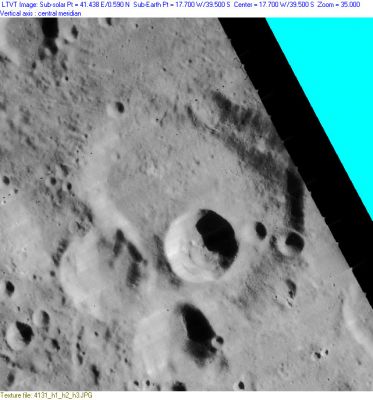Heinsius
Contents
Heinsius
|
Lat: 39.5°S, Long: 17.7°W, Diam: 64 km, Depth: 2.65 km, Rükl: 64 |
Table of Contents

LO-IV-131H
Images
LPOD Photo Gallery Lunar Orbiter Images
Maps
(LAC zone 111B3) LAC map Geologic map
Description
Description: Elger
(IAU Directions) HEINSIUS.--A very curious formation on the N.W. of Tycho: a fine telescopic object under oblique illumination. It has an irregular but continuous border, except on the S., where two large ring-plains have encroached upon it, and a third, N. of a line joining their centres, occupies no inconsiderable portion of the floor. Heinsius is nearly 50 miles across, and the border on the E., is nearly 9,000 feet above the interior, which includes, at least, three small craters. The walls of the intrusive ring-plains have craters on their summits; the more easterly has two on the E., and its companion, one on the S.E. The ring-plain on the floor has a crater on its W. wall. Schmidt shows a small crater between the ring-plains on the S. border.
Description: Wikipedia
Additional Information
Depth data from Kurt Fisher database
- Westfall, 2000: 2.65 km
- Viscardy, 1985: 2.7 km
- Cherrington, 1969: 2.1 km
- Satellite crater Heinsius A is on the ALPO list of bright ray craters.
- A possible Concentric Crater (CC) immediately north-northwest of Heinsius B, discovered (or re-discovered?) by Danny Caes on the LRO's online Act-React Quick Map, June the 8th, 2012. On second thoughts, while investigating the online Hi-Res scans of Lunar Orbiter 4's frames 124-h2 and 131-h2, it (that so-called CC near Heinsius B) doesn't look concentric at all! - DannyCaes DannyCaes Jun 8, 2012.
- Bright impact ray-craterlet on the northwestern part of Heinsius's floor. See LPOD Splashes of Brightness and the LRO's Act-React Quick Map.
Nomenclature
- Gottfried; German astronomer (1709-1769).
- An unnamed craterlike formation northeast of Heinsius was called Renart by Wilkins and Paluzie-Borrell, but the I.A.U. did not accept that name.
- Renart (Dionis Renart Garcia) was a Spanish astronomer (1878-1946).
- J.H.Schroter's Vinc. Wing (plate T. LV). This is a somewhat vaguely-defined depression at 16.4°W, 41.3°S, about 55 km in diameter, extending from the modern Wilhelm D to Heinsius M. Vincent Wing (1619-1668) was a self-taught English astronomer known for his many publications, including the founding of an almanac continued for more than a century. Flamsteed reportedly regarded Wing's Ephemerides as the best available at the time. His most noted work was a a complete system of astronomy, Astronomia Britannica (1652, 2nd ed. 1669). Research Jim Mosher.
LPOD Articles
Bibliography
"Renart": THE MOON by H.P.Wilkins and P.Moore.
This page has been edited 1 times. The last modification was made by - tychocrater tychocrater on Jun 13, 2009 3:24 pm - afx2u2